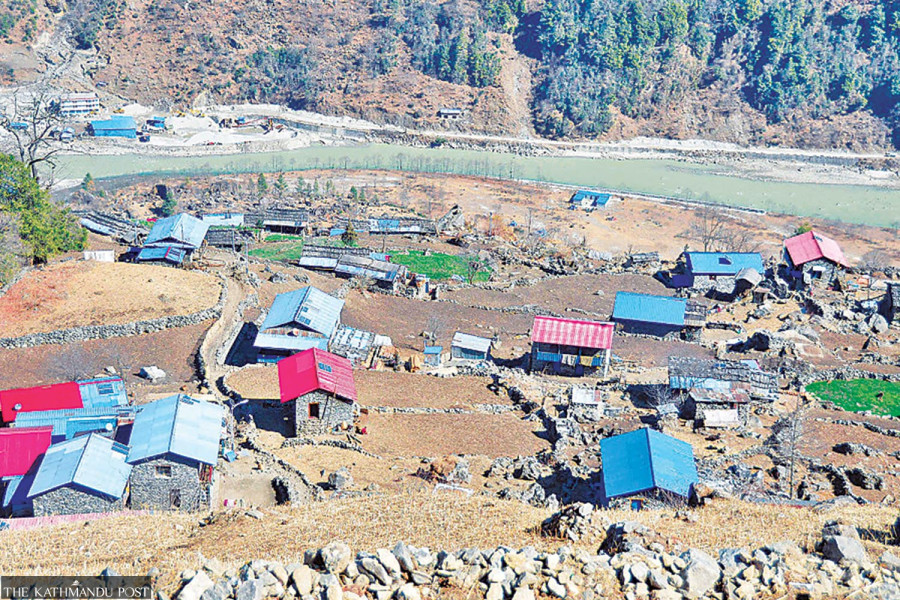National
Dahal to take cross-border power transmission proposal to China
Beijing’s cooperation will also be sought to supply electricity to remote Nepali villages from the Chinese grid.
Prithvi Man Shrestha
Nepal is preparing to propose two-cross border transmission line projects with China during Prime Minister Pushpa Kamal Dahal’s planned visit to the northern neighbour, officials at the Ministry of Energy, Water Resources and Irrigation said.
Dahal's scheduled visit to China in the third week of September will coincide with his proposed visits to the United Nations General Assembly in New York.
Addressing the 38th anniversary of Nepal Electricity Authority (NEA) on Friday, Prime Minister Dahal said that the government was moving forward the plan to build the 220kV Chilime-Kerung cross-border power line.
Nepal also plans to propose to the Chinese side another cross-border power line via the Kimathanka border point, said a senior official at the energy ministry. “There have been talks with the foreign ministry on these projects.”
Kimathanka is located in Bhotkhola Rural Municipality of Sankhuwasabha district of Koshi Province.
There is no transmission line connecting the two neighbours. As a result, Nepal is fully reliant on India to buy electricity in the dry season and sell its excess power, particularly in the wet season.
In fact, the southern neighbour has been buying up to 452.6 megawatts of electricity from Nepal with the help of improved transmission connectivity of late.
Nepal has proposed the 400kV Ratamate-Rasuwagadhi-Kerung Cross-Border Transmission Line for electricity trade with China. The government has already conducted a feasibility study for the project, whose proposed length is around 70km and can carry 5,000MW power, according to the Nepal Electricity Authority.
During the meeting of the Joint Working Group comprising representatives of the NEA and the State Grid Corporation of China in February, the Chinese side had called for reducing the capacity of the power line to 220kV.
Nepal is building a 220kV substation at Chilime Hub, which is 16km from Rasuwagadhi, a border point with China. China is also distributing power in its bordering areas with a 220kV line, according to an NEA official.
Negotiations with the Chinese side are underway to build the 220kV cross-border line, which can be expedited to make early trading of power possible, the NEA official said on condition of anonymity. “There is also the possibility of the two countries signing power trade agreements during Prime Minister Dahal’s Beijing visit.”
Building of the 220kV transmission line will enable the two countries to trade power in the next few years, the NEA official said. The two sides were also discussing the modality of funding the project—whether the Chinese would help build the power line on the Nepal side too or will it do so only in its territory.
The nearest substation of China is around 80km from the border point, the official said.
Speaking in Chitwan last week, Prime Minister Dahal had said there would be a new power-trade agreement with China during his upcoming visit.
The NEA official made it clear that a 400kV cross-border line will be a future priority. “Negotiations with China to downsize the capacity are aimed at building power lines on a fast-track basis so that power trade can happen soon,” the NEA official said.
Besides cross-border transmission, Nepal also seeks China’s help to meet its goal of electrifying the country by providing 100 percent electricity cover to its population in the next two years, up from 98 percent at present.
“There are over 1,200 families in half a dozen rural municipalities bordering China who lack access to electricity,” said the ministry official. “As providing them electricity via Nepal’s infrastructure is both time-consuming and costly, we seek the help of China’s distribution system for the purpose.”
There is also a plan to request the Chinese side to develop a big hydropower project in Nepal. One such project for consideration is the 454 MW Arun-Kimathanka.
Currently, this project is owned by Vidyut Utpadan Company Limited (VUCL), a government entity. “We have referred this project to the foreign ministry for development with joint investments of Nepal and China,” the energy ministry official said. “The VUCL can join hands with any Chinese company to develop it.”
Nepal also seeks China’s help to develop the underground electricity distribution system or the mono-pillar distribution system along the Kathmandu Ring Road, which is being widened with China's assistance.
Nepal also needs foreign assistance to build more charging stations for electric vehicles, an NEA official said.




 11.12°C Kathmandu
11.12°C Kathmandu















